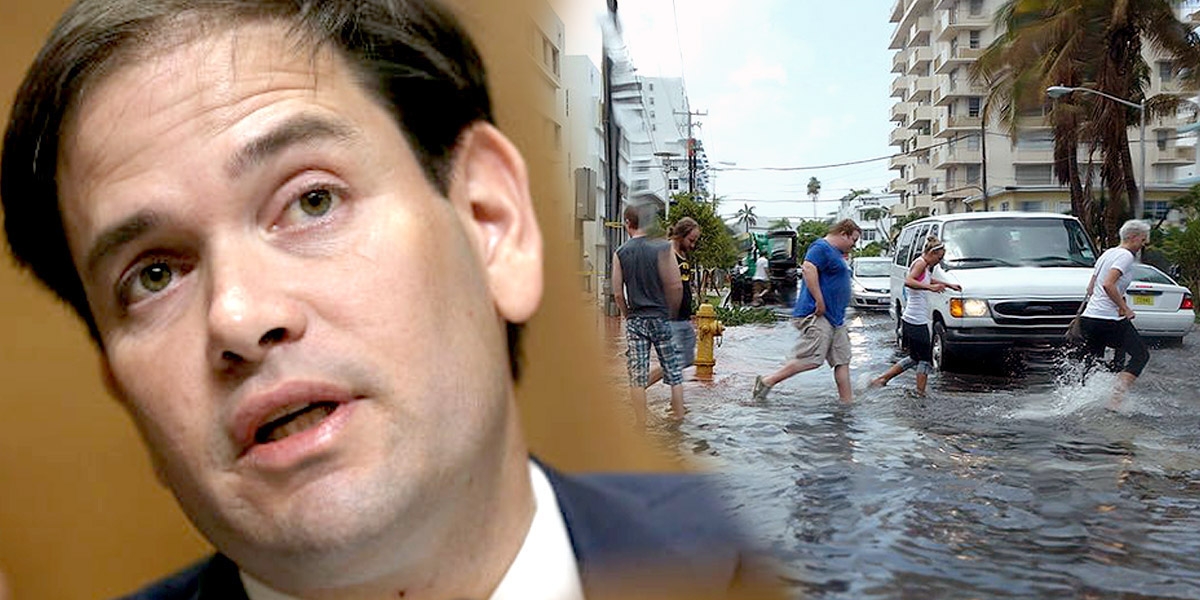
Marco Rubio Once Again Denies Climate Change as Florida’s King Tides Inundate Streets

Sen. Marco Rubio refused to acknowledge human-caused climate change at a Florida Senate debate Monday even as a foot of water inundated city streets and sewers throughout South Florida, driven by the annual king tide combined with rising seas.
The king tide occurs when a full moon is aligned with the Earth and sun, exerting gravitational forces that are exacerbated by the naturally-occurring high tides. As sea levels around Florida have risen, these king tides have become regular flooding events.
Rubio argued for an “all-of-the-above” energy strategy, including oil, coal, natural gas and nuclear energy, and said he favored mitigation strategies, “if in fact sea levels are rising.”
Patrick Murphy, Rubio’s Democratic challenger, responded in the debate by saying, “Look out your window, right? There’s two or three inches of saltwater on the roads right now. They were not built underwater. Go down to the Florida Keys. The reefs are dying from acidification and bleaching.”
Some 76 percent of Florida’s population resides in coastal communities—regions that are highly vulnerable to storm surges, high tides, rising waters and hurricanes. According to a 2010 report prepared by the Florida Oceans and Coastal Council, “Much of the current infrastructure of coastal Florida will need to be replaced or improved during ongoing sea-level rise.” The report puts the cost at $3 trillion by 2030.
Sea Levels Rising at Fastest Rate in 3,000 Years https://t.co/tJw97sB32t @ClimateReality @sierraclub @greenpeaceusa pic.twitter.com/XEGYAA7Wue
— EcoWatch (@EcoWatch) February 23, 2016
“Eventually, the water comes into the roads, comes into the streets, comes into our homes, possibly,” Miami Beach resident Norman Cohen told WSVN.
With the unmistakeable evidence of climate change right before them, 15 Florida mayors—including Republicans—earlier this year requested a meeting with Rubio to discuss the risk faced by their communities. The meeting never took place.
15 Florida Mayors to #MarcoRubio: We're Going Under, Take #ClimateChange Seriously https://t.co/rus7W3dYmA @350 pic.twitter.com/7ESx0ZGvmL
— EcoWatch (@EcoWatch) January 28, 2016
Asked by CNN’s Jake Tapper during a primary debate in March if he would honor the Miami mayor’s request to acknowledge climate change, Rubio responded, “There has never been a time when the climate has not changed.” He has called the investigation into Exxon Mobil’s knowledge about climate change “nothing but a left-wing effort to demonize industries in America.”
According to the website Dirty Energy Money, Marco Rubio, who grew up in West Miami, has accepted $637,273 from oil and coal companies and those who promote carbon-based business. Fivethirtyeight.com gives Rubio a 71 percent chance of retaining his Senate seat.
“It is deeply unfortunate that a state like Florida, which is on the frontlines of dealing with climate change impacts, is represented by a climate change-denying senator like Marco Rubio,” said Michael Mann, distinguished professor of Atmospheric Science and director of the Earth System Science Center at Penn State University.
Meanwhile, the high waters are rising. This past weekend, roads and streets flooded in South Florida. A seawall in Fort Lauderdale couldn’t hold back the tide, beaches continued to erode and untreated sewage spilled from manholes in Jacksonville during Hurricane Matthew.
Here’s a study from @univmiami showing a 400% increase in flooding in #MiamiBeach just since 2006. https://t.co/hJMxnHgkeW (2/n) pic.twitter.com/jwYmiBDx2P
— John Morales (@JohnMoralesNBC6) October 18, 2016
Nevertheless, the unrelenting real estate boom continues in South Florida. Condo builders alone are adding 27 million square feet of living space in Miami-Dade, Palm Beach and Broward counties. Florida added 29,000 newly-minted real estate agents in 2015. The boom rolls on even as a Zillow study released in August showed that 900,000 Florida properties will be under water by 2100. A total of $188 billion in residential property is at risk of damage from storm surge.
The state won’t have to wait until the end of the century to see the growing effects of sea level rise. Among some scientists, the question is when the exodus of Florida’s population will begin.
“Miami and the whole of South Florida is not going to be like this anymore,” Henry Briceño, a water-quality researcher at Florida International University, told The Globe and Mail. “And then, sooner or later, we’ll have to move. Most of the population will have to move.”
Real estate values are soaring now, but the implication is that they will eventually fall as homeowners look to get out. With 2.4 million Florida residents living within four feet of sea level, that may begin within the next couple of decades.
“As the reality of seawater rise sinks in, mortgage companies may conclude that 30 years is too long of a time to gamble on,” said Philip Stoddard, a biology professor at Florida International University and the mayor of South Miami.
Our new report shows how coastal flooding is on the rise because of human-caused sea level rise https://t.co/Zr1N6RtgrJ pic.twitter.com/FWPXTfokBb
— Climate Central (@ClimateCentral) October 17, 2016
Insurance can only go so far. Most flood insurance comes from the National Flood Insurance Program, which—prior to Hurricane Matthew—was $23 billion in debt. Matthew will add at least another $4 to $6 billion. Many private insurance companies have already realized that they can’t rely on historical data to assess risk for future events that will be enhanced by climate change. But Florida and other states cap premiums for those living in more vulnerable areas, which removes any incentive for residents to own up to the risks they’re taking.
New research published last week from scientists at Princeton University and Rutgers University showed that New York City could be hit by a Hurricane Sandy-like superstorm every two decades as a result of ocean warming and sea level rise, and said that the study could easily be replicated all along the East Coast. In Florida, the devastating effects of climate change are running headlong into the cadre of climate deniers, championed by Marco Rubio.

 233k
233k  41k
41k  Subscribe
Subscribe 